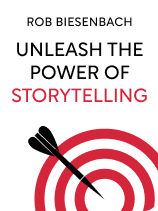

This article is an excerpt from the Shortform book guide to "Unleash the Power of Storytelling" by Rob Biesenbach. Shortform has the world's best summaries and analyses of books you should be reading.
Like this article? Sign up for a free trial here.
What makes a story interesting? How can you, as the storyteller, humanize yourself to your audience? How can you communicate a message that transcends the plot?
You can think of a character, a goal, and an obstacle as the basic requirements for a story. But, even with those elements in place, not every story holds a listener’s attention. Rob Biesenbach says a story needs four additional characteristics to make it engaging.
Read more to discover the power of these four elements that keep your audience tuned in to your story.
#1: An Emotional Appeal
What makes a story interesting? First, an interesting story appeals to the listener’s emotions. An emotionally relevant story feels more compelling in the moment and remains more memorable later on. Biesenbach points to research findings that memories of emotional events tend to be stronger (and stick around longer) than memories of events that don’t have strong emotions attached. So we remember a story that engages our emotions—for example, one where we felt happy for the character’s success—more clearly than one that doesn’t.
(Shortform note: A growing body of research confirms that an emotional story engages us by activating a wide range of processes in the brain. Brain regions that process language, emotion, and complex information activate in response to stories, as do parts of the brain involved in prediction. The brain waves of the listener also synchronize with those of the storyteller. That might be why Will Storr, author of The Science of Storytelling, says that storytelling is a way of “communicating with emotions rather than facts.” He explains that the most engaging stories appeal to emotions like hope and tap into narratives that people want to be a part of.)
#2: An Accessible Theme
Next, a good story has a theme that people relate to: Even though listeners might have never experienced the situation you’re talking about, the story should call on a universally relatable experience to create common ground. For example, you don’t have to live in Brooklyn or own a bookstore to know what novelist Emma Straub is talking about when she says that she hopes her bookstore will appear on “children’s internal maps of their neighborhood.” Her story about opening Books Are Magic appeals to themes of community and belonging.
(Shortform note: Though Biesenbach is primarily talking about telling a story rather than writing one, writers tend to agree with his advice to find a theme that will resonate with your audience. In On Writing Well, William Zinsser explains that you need to find humanity in your story: a shared experience or a deeper truth that lies beneath the specific situation. Zinsser thinks that humanity is why we read books about people who find themselves in circumstances we’ve never experienced ourselves: Their resilience in the face of challenges or their persistence in their search for meaning feels relatable to us.)
#3: A Point of View
In addition to telling your listeners something about themselves, a good story tells them something about you. Biesenbach explains that by revealing something about who you are, the right story humanizes you. It illustrates how you see the world, communicates how you’re unique, and makes you memorable. For example, a childhood story about how you accidentally caused a neighborhood blackout could either reveal how your love of electrical engineering began or illustrate why you never do electrical work: It all depends on your point of view.
(Shortform note: Your point of view isn’t incidental to the story you tell: Experts agree that it’s a crucial part of how you tell the story and why you tell it. In On the Origin of Stories, Brian Boyd argues that evolutionarily, fictional narratives serve the crucial purpose of helping us understand how other people experience the world. This helps us increase our capacity for empathy, a skill that’s necessary for cooperation and thus survival. Some social animals, like honeybees, even have a rudimentary form of narrative that helps them understand each other.)
#4: An Appeal to Values
Finally, a good story transcends its particular details to convey a larger message, often about values you share with your listeners. People who feel involved in your story because of those shared values will remember that story. For example, a story about how your neighborhood banded together to replant a vegetable garden that was washed out in a storm will appeal to listeners who value collaboration, resilience, and mutual aid.
(Shortform note: A story that illuminates your values can connect those values to the actions you want people to take, which proves helpful when you want to convince people to get behind a cause. One public policy lecturer explains that in these situations, you can use a “public narrative” that combines three kinds of stories: a “story of self,” which explains how you were called to a given cause; a “story of us,” which illustrates your goals; and a “story of now,” which presents an urgent challenge to your community’s values. A public narrative draws on these stories to unite people behind actions they can take to uphold shared values in their community.)
Though many of us think we instinctively know how to tell a good story, we often miss the mark. Biesenbach says that much of the time, that happens because the story is missing one of its essential characteristics. He explains some of the ways that things tend to go wrong:
- If a story doesn’t have a character whom listeners care about, it doesn’t feel like the problem you’re describing affects real people.
- If a story lacks strong conflict (which comes from the tension between the character and the obstacle), it doesn’t hold the audience’s attention.
- If a story doesn’t have high enough stakes, the listener doesn’t feel motivated to learn how the character solves the problem.
- If a story is missing clear cause and effect, the chain of events sounds like a coincidence, which is less meaningful than causality.
- If a story doesn’t have an emotional core, the audience doesn’t feel invested in it.
| Troubleshooting Your Plot With an Understanding of Situation vs. Story When a story goes wrong, it’s often because the storyteller has confused two fundamental (and fundamentally different) narrative elements: the situation and the story. Journalist Vivian Gornick made this now-famous distinction in The Situation and the Story. Gornick writes that every piece of literature has both a situation and a story. The situation is the context, the circumstance, or the plot. The story is the emotional experience and the insight that drives the storyteller to explain the plot. You need both of them to create an engaging character, strong conflict, high stakes, clear causality, and an emotional core that Biesenbach explains a story needs. You can think of each of the scenarios he outlines above as involving a mistake in the situation, the story, or the relationship between them: A character who isn’t relatable or isn’t engaging listeners is just going through the motions of the story, and the situation—the character’s internal experience—is either missing or is inadequately connected to the plotline. A story that doesn’t have enough conflict or tension might have a perfectly crafted narrative arc (a story) but fail to connect the external events of the plot to the character’s internal struggle during their efforts to reach their goal (the situation). A plotline that feels low-stakes might need more drama in its story—can you compress the timeline or start in the middle of the action?—or you might need to focus more on how the events of the story affect your character (the situation). A narrative without a clear sense of cause and effect needs a tighter story: You can think of the events of the story as connected with the words “so then” rather than “and then” to naturally start to connect cause to effect. A story without an emotional core doesn’t have a clear situation: Without an understanding of how the events in the story affect your character’s emotions, your listeners won’t feel strongly about the outcome of the plot. |

———End of Preview———
Like what you just read? Read the rest of the world's best book summary and analysis of Rob Biesenbach's "Unleash the Power of Storytelling" at Shortform.
Here's what you'll find in our full Unleash the Power of Storytelling summary:
- How telling a story can make any message more compelling
- The unique power stories have to influence us and shape our emotions
- The crucial pieces that make up a story (other than the beginning, middle, and end)







Very interesting post. Loved Reading this.